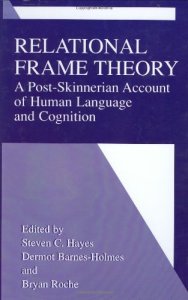Mastering the Clinical Conversation: Language as Intervention
M. Villatte, J.L. Villatte, & S.C. Hayes
As empirically minded practitioners struggle to keep pace with the proliferation of evidence-based interventions, interest in common psychological treatment mechanisms is at an all-time high. Yet the element shared by virtually all psychotherapies–language–has largely been ignored. This is the first book to present an evidence-based approach to using language intentionally to produce therapeutic effects, independent of specific treatment packages or modalities. Grounded in relational frame theory (RFT), the volume provides a conceptual toolkit and practical strategies for harnessing the power of language to free clients from life-constricting patterns and promote psychological flourishing.
Exploring the role of language processes in the development and maintenance of psychological problems, the book addresses a core question: How can psychotherapists alleviate the suffering caused by language and cognition through the use of language and cognition? The authors share innovative ways to enhance assessment and intervention using specific kinds of clinical conversations. Techniques are demonstrated for identifying language traps that keep clients stuck, activating and shaping behavior change, building a flexible sense of self, fostering meaning and motivation, creating powerful experiential metaphors and exercises, and strengthening the therapeutic relationship. More than 80 clinical vignettes with commentary by the authors show what the methods look like in real-world clinical practice. User-friendly features include chapter summaries that highlight key points to remember, plus a “Quick Guide to Using RFT in Psychotherapy” filled with sample phrases and questions to ask.
Translating cutting-edge theory and research into concrete techniques that any psychotherapist can begin implementing immediately, this book will be read with interest by clinical psychologists, psychiatrists, clinical social workers, mental health and pastoral counselors, and psychiatric nurses, as well as graduate students.
 Learning RFT: An Introduction to Relational Frame Theory and its Clinical Applications
Learning RFT: An Introduction to Relational Frame Theory and its Clinical Applications
Niklas Torneke
Relational frame theory, or RFT, is the little-understood behavioral theory behind a recent development in modern psychology: the shift from the cognitive paradigm underpinning cognitive behavioral therapy to a new understanding of language and cognition. Learning RFT presents a basic yet comprehensive introduction to this fascinating theory, which forms the basis of acceptance and commitment therapy. The book also offers practical guidance for directly applying it in clinical work.
In the book, author Niklas Törneke presents the building blocks of RFT: language as a particular kind of relating, derived stimulus relations, and transformation of stimulus functions. He then shows how these concepts are essential to understanding acceptance and commitment therapy and other therapeutic models. Learning RFT shows how to use experiential exercises and metaphors in psychological treatment and explains how they can help your clients. This book belongs on the bookshelves of psychologists, psychotherapists, students, and others seeking to deepen their understanding of psychological treatment from a behavioral perspective.
Relational Frame Theory: A Post-Skinnerian Account of Human Language and Cognition
Edited by S.C Hayes, D. Barnes-Holmes, & B. Roche
This volume goes beyond theory and gives the empirical and conceptual tools to conduct an experimental analysis of virtually every substantive topic in human language and cognition, both basic and applied. It challenges behavioral psychology to abandon many of the specific theoretical formulations of its most prominent historical leader in the domain of complex human behavior, especially in human language and cognition, and approach the field from a new direction. It will be of interest to behavior theorists, cognitive psychologists, therapists, and educators.
Advances in Relational Frame Theory: Research & Application
Edited by S. Dymond & B. Roche
As acceptance and commitment therapy (ACT) increases in popularity among clinicians, it becomes more and more vital to understand its theoretical basis, relational frame theory (RFT). RFT is a psychological theory of human language and cognition, developed by Steven C. Hayes. It focuses on how humans learn language and how language connects them to their environment. In essence, our thoughts, feelings, and behaviors are dependent on our experiences and the context that these experiences provide.
Edited by leading relational frame theory (RFT) scholars, Simon Dymond, PhD, and Bryan Roche, PhD, Advances in Relational Frame Theory presents advances in all aspects of RFT research over the last decade, and provides a greater understanding of the core principals of acceptance and commitment therapy (ACT). The book also contains chapters written by Steven C. Hayes and Kelly Wilson, both research-active experts from the RFT community around the world.
Because ACT is focused largely on accepting one’s thoughts, it is important to understand where these thoughts come from. And while many books on RFT are abstract and require extensive knowledge of behavior analysis, this is the first book to comprehensively but accessibly introduce RFT to ACT mental health professionals.
Gaining a deeper knowledge of the relational concepts of RFT can help you understand why a person’s behavior does not always match up with their self-professed values. Whether you are a mental health professional, or simply someone who is interested in the connection between language and experience, this book is an invaluable resource.
The Self and Perspective taking: Contributions from Modern Behavioral Science
Edited by Louise McHugh & Ian Stewart
Helping clients cope with problems of self is an important goal of modern psychotherapy. However, without ways of understanding or measuring the self and self-relevant behavior, it’s difficult for psychologists and researchers to determine if intervention has been effective.
From a modern contextual behavioral point of view, the self develops in tandem with the ability to take perspective on one’s own and other people’s behavior. This collection of articles by Steven Hayes, Kelly Wilson, Louise McHugh, Ian Stewart, and other leading researchers begins with a complete history of psychological approaches to understanding the self before presenting contemporary accounts that examine the self and perspective taking from behavioral, developmental, and cognitive perspectives. The articles in The Self and Perspective Taking also explore the role of the self as it relates to acceptance and commitment therapy, cognitive behavior therapy, and mindfulness processes. Featuring work from world-renowned psychologists, this resource will help clinicians augment self-understanding in clients, especially those with autism spectrum disorders, schizophrenia, and impaired perspective-taking abilities.
The Handbook of Contextual Behavioral Science
Edited by R. Zettle, S.C. Hayes. D. Barnes-Holmes, & T. Biglan
The Wiley Handbook of Contextual Behavioral Science describes the philosophical and empirical foundation of the contextual behavioral science movement; it explores the history and goals of CBS, explains its core analytic assumptions, and describes Relational Frame Theory as a research and practice program.
This is the first thorough examination of the philosophy, basic science, applied science, and applications of Contextual Behavioral Science.
Brings together the philosophical and empirical contributions that CBS is making to practical efforts to improve human wellbeing. Organized and written in such a way that it can be read in its entirety or on a section-by-section basis, allowing readers to choose how deeply they delve into CBS. Extensive coverage of this wide ranging and complex area that encompasses both a rich basic experimental tradition and in-depth clinical application of that experimental knowledge. Looks at the development of RFT, and its implications for alleviating human suffering.
Edited by R. A. Rehfeldt & Y. Barnes-Holmes
Derived Relational Responding offers a series of revolutionary intervention programs for applied work in human language and cognition targeted at students with autism and other developmental disabilities. It presents a program drawn from derived stimulus relations that you can use to help students of all ages acquire foundational and advanced verbal, social, and cognitive skills.
The first part of Derived Relational Responding provides step-by-step instructions for helping students learn relationally, acquire rudimentary verbal operants, and develop other basic language skills. In the second section of this book, you’ll find ways to enhance students’ receptive and expressive repertoires by developing their ability to read, spell, construct sentences, and use grammar. Finally, you’ll find out how to teach students to apply the skills they’ve learned to higher order cognitive and social functions, including perspective-taking, empathy, mathematical reasoning, intelligence, and creativity. This applied behavior analytic training approach will help students make many substantial and lasting gains in language and cognition not possible with traditional interventions.
The ABCs of Human Behavior: Behavioral Principles for the Practicing Clinician
Jonas Ramnero & Niklas Torneke
When cognitive behavior therapy emerged in the 1950s, driven by the work of Albert Ellis and Aaron Beck, basic behavior principles were largely sidelined in clinical psychology curricula. Issues in cognition became the focus of case conceptualization and intervention planning for most therapists. But as the new third-wave behavior therapies begin to address weaknesses in the traditional cognitive behavioral models-principally the modest effectiveness of thought stopping and cognitive restructuring techniques-basic behavior principles are once again attracting the interest of front-line clinicians. Many of today’s clinicians, though, received their training during the years in which classical behaviorism was not a major part of clinical education. In order to make the best use of the new contextual behaviorism, they need to revisit basic behavioral principles from a practical angle. This book addresses this need.
The ABCs of Human Behavior offers practicing clinicians a pithy and practical introduction to the basics of modern behavioral psychology. The book focuses both on the classical principles of learning as well as more recent developments that explain language and cognition in behavioral and contextual terms. These principles are not just discussed in the abstract-rather the book shows how the principles of learning apply in the clinical context. Practical and easy to read, the book walks clinicians through both common sense and clinical examples that help them learn to use behavioral principles to observe, explain, and influence behavior in a therapeutic setting.






